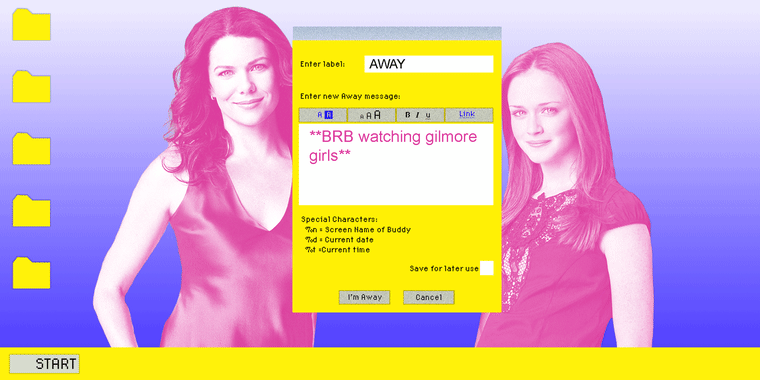In 2020, we all need comfort TV more than ever. But “Gilmore Girls” has been that for fans since it premiered two decades ago.
When the series debuted on Oct. 5, 2000, the WB placed it in a difficult time slot: Thursdays at 8 p.m., opposite one of the top-rated shows on television, NBC's "Friends."
As Lauren Graham recalls in her 2016 memoir, "Talking as Fast as I Can," "The WB itself was still very new, and the ratings, even of their most successful shows, already tended to be much lower than those of the big four networks. So on Thursday nights against America's favorite sitcom, we had almost zero chance of finding an audience."
However, "Gilmore Girls" defied the odds, moving to a new Tuesday time for its sophomore season and, as Graham writes, "the ratings began ticking up."
The show, which focuses on the close relationship between 30-something single mother Lorelai and her teenage daughter, Rory, had clearly struck a chord with viewers — and still does to this day.
“It’s this idyllic world that doesn’t actually exist but everyone wants it to,” Jennie Whitaker, who created the “Gilmore Girls” Fan Fest in 2016 with her husband, Marcus, told TODAY. “And people go to the festival, I think, to revisit it, because there has not really been a show like it that has created the same feeling for people.”
Whitaker’s annual festival, which for the past four years has featured a weekend of “Gilmore”-centric events amid a setting reminiscent of the show’s fictional New England town, was supposed to celebrate the series’ 20th anniversary in Kent, Connecticut, the third week of October, but will now be held as a virtual event. While past installments have included participatory activities such as a costume contest, in which attendees dress as their favorite characters, Whitaker is planning to re-create some of those interactive elements online, along with a series of themed cast panels similar to those from previous years.
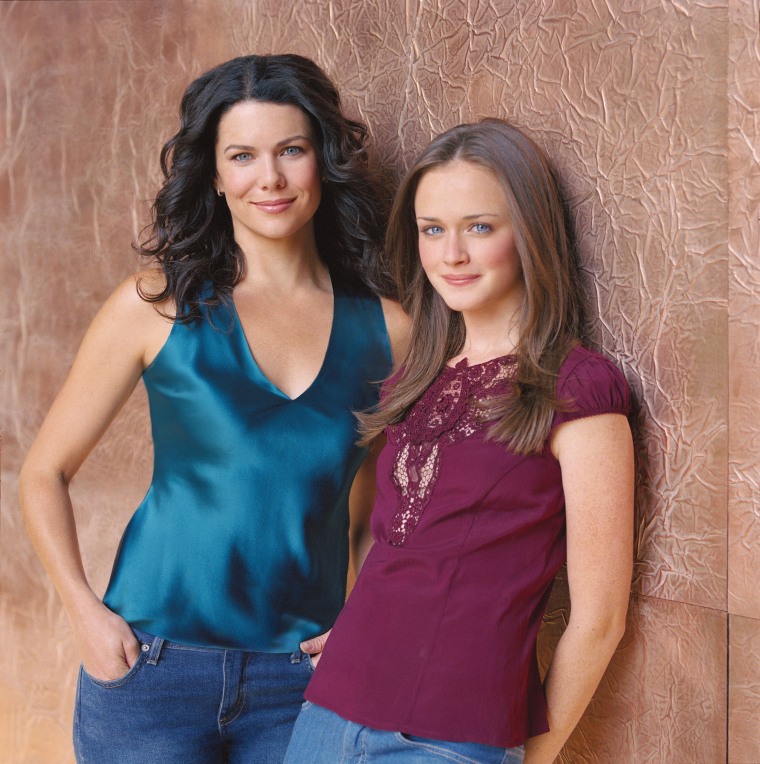
Though "Gilmore Girls" went off the air in 2007, fervor for the series was reignited when all seven seasons began streaming on Netflix on Oct. 1, 2014. That same day, Kevin Porter and Demi Adejuyigbe began dissecting episodes weekly in their “Gilmore Guys” podcast.
Then, in late 2014, news spread around social media faster than gossip travels in Stars Hollow: The “Gilmore Girls” cast would be reuniting in Austin, Texas, at the ATX Television Festival. Passes sold out two months before the panel, which featured 15 members of the show’s cast, including stars Lauren Graham and Alexis Bledel.
“Stars Hollow was a place people could escape to,” Emily Gipson, who co-founded the ATX festival with Caitlin McFarland, told TODAY via email. “This was a place where the characters cared about each other and their town. People want a place to belong, and in Stars Hollow, everyone does. At the center of that you have Lorelai and Rory: two people who are so different but have this idealistic relationship of what we all want — not just out of mother-daughter relationship but out of a friendship. Then you add on a lot of amazing one-liners and some great romantic tensions, and you have the makings of a near-perfect series.”
“People felt this sense of joy when they watched the show each week, and being transported back to that time and place brought that feeling back tenfold,” said Gipson of the cast panel her festival hosted in June 2015.
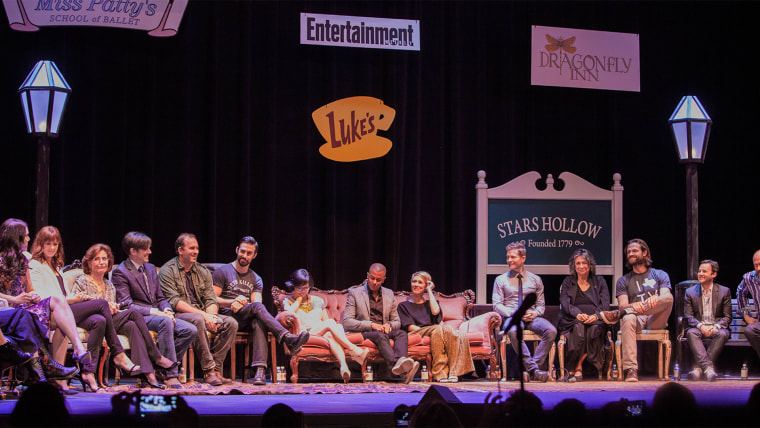
Whitaker said the show’s wholesome, honest appeal is what makes it relatable.
“I think a lot of TV is more violent, more gruesome,” she said. “No one dies tragically in ‘Gilmore Girls.’ There are no gotcha moments, or surprising you with something terrible. There’s no gratuitous violence. It’s just the really great idyllic world where things happen naturally, the way they should. I don’t think TV’s written the same way anymore.”
"Gilmore Girls" actor Kelly Bishop, who played matriarch Emily Gilmore, told TODAY, "There's really an innate sweetness about it, which sounds kind of icky, but it's not that. There's a decency about it."
She added, "If you look at the male characters in that show, there's no nasty guy. There's no jerk. There's no misogynist. There's no violence. They're just trying to make their way in the world like all the rest of us. There is basically an innate decency about these people. They're good people. Some of them are very strange. But they're good."
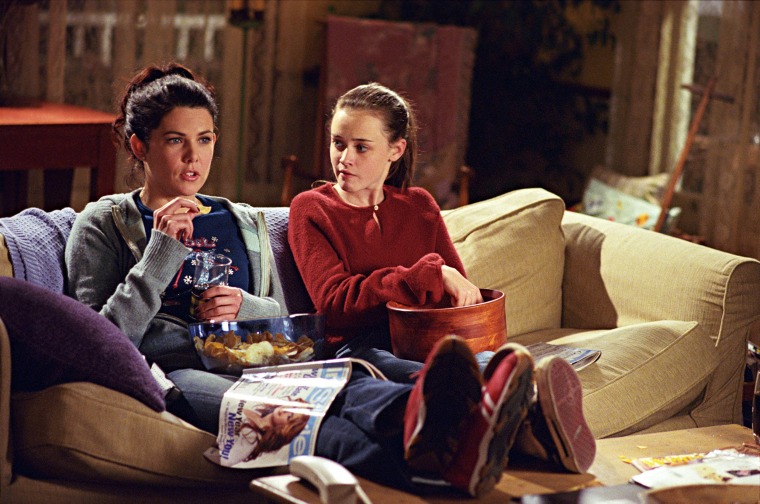
Porter told TODAY his podcast aimed to foster the feeling of community portrayed among Stars Hollow’s residents.
“The whole idea of the show was a sort of idealistic valentine to the family you wish you could have or the small town you wish you could live in, and so doing a podcast was us trying to embody those things and pay homage to the show in that way.”
Porter also attributes his podcast’s popularity to the fact that social media as we know it didn’t exist during the show’s original run in the early 2000s.
“I think the reason so many people listen to (the podcast) is because ('Gilmore Girls') was on at a time that online fan communities were just starting to bubble up,” he said. “Twitter wasn’t a thing back then, and the way that we watch TV and talk about it with each other online and make memes of it, that just didn’t exist. The discourse was pretty fractured and isolated. So I think, honestly, just having something resembling a community with which to talk about the show was a nice release for people.”
The “Gilmore Guys” podcast’s live events proved to be bonding experiences for mothers and daughters, couples, and even new friends who met via the podcast’s community of listeners, said Porter.
And the Fan Fest has provided a backdrop for “Gilmore” enthusiasts to share special moments and milestones with loved ones.
“We get emails from people saying it’s brought them together with their daughters, their moms, their best friends, their sister-in-laws, their mother-in-laws, their grandparents,” said Whitaker. “There’ve been people who’ve gotten engaged at the festival. There are people who have overcome anxiety who’ve come who said, ‘I never go to public events because I can’t, but this group makes me feel so safe online that I came and I dealt with the big crowds.’ We’ve had people plan bachelorette parties, we’ve had people come with newborns. We’ve had an engagement at least every year. There’s a single dad and he was raising his daughter, but they never had a thing that was uniquely theirs, and the last two years before she went to college they’ve gone two years in a row.”
Whitaker describes “Gilmore” lovers as “the nicest fans in the world.”
Rituals at the Fan Fest have included a “kindness award,” in which attendees are honored for selfless gestures, and a token exchange conceived by festivalgoers who began arriving bearing small gifts from their hometowns to give one another.
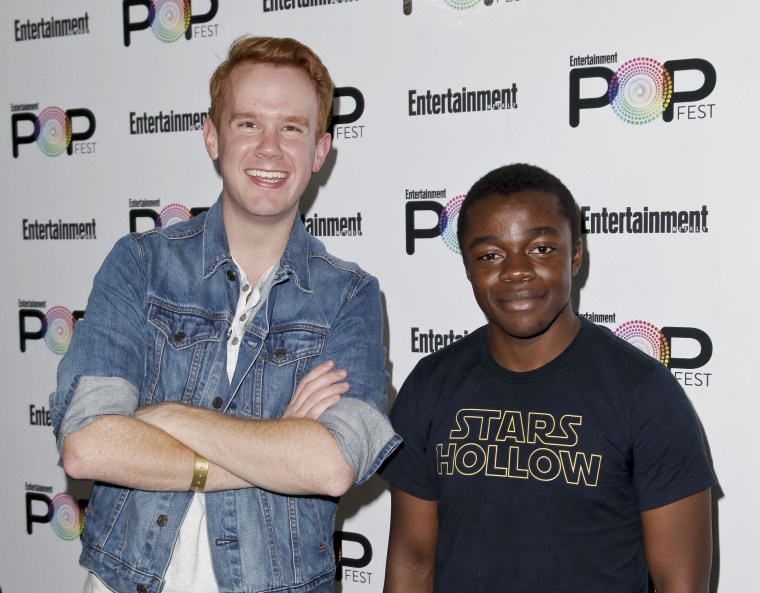
Porter also emphasized his listeners’ graciousness.
“People would write in and be so generous with their time and their lives and their sincerity and candor and just talk about what the show meant to them, what it meant to revisit those things or to have someone be able to kind of take seriously the things that they thought people were taking for granted at the time the show was on,” he said. “It wasn’t such a cultural phenomenon when it was on the WB, then CW. It wasn’t something that had garnered a lot of acclaim or capital 'R' respect even though it was adored by a lot of people, so I think there’s a lot of gratitude for having an outlet or a platform to talk about that stuff.”
Whitaker said running the festival has given “Gilmore Girls” new meaning for her.
“I rarely think of the show as just a show,” she said. “I think of it as the community of the festival and the people I’ve met. There are people all over the world that I never would have the opportunity to call friends that we speak to on a weekly basis and that happened because of the show.”
For more information on the "Gilmore Girls" Fan Fest, visit its website.
